Okra Health Benefits: 5 Science-Backed Reasons To Eat It
Try out interesting ways to add the low-calorie veggie to your diet and give your health a boost.
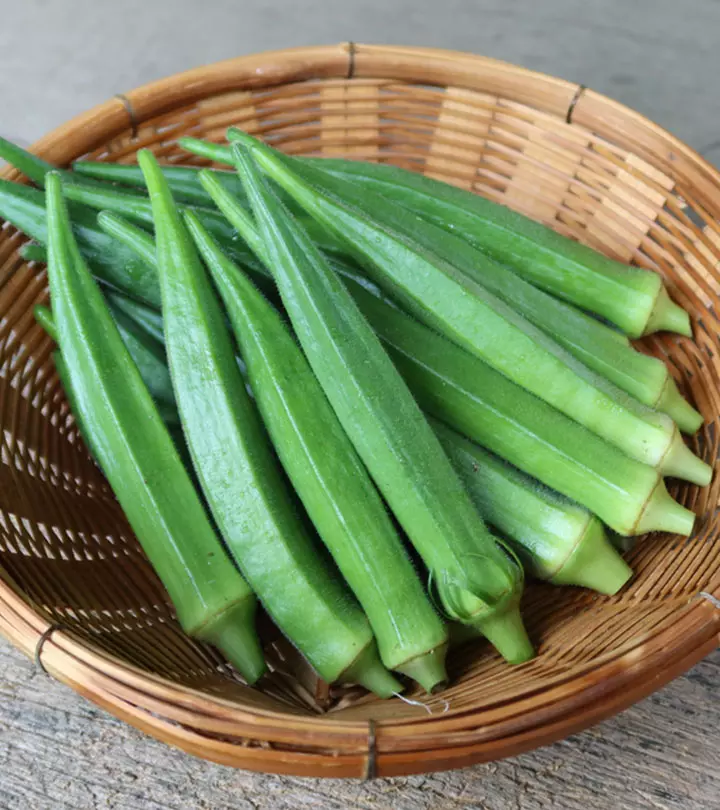
Image: Shutterstock
Okra is a popular vegetable used in many cuisines worldwide. The health benefits of okra are well researched, and this vegetable is loaded with many nutrients, vitamins, and essential minerals. Okra is also known as lady’s fingers and is loaded with dietary fiber. It is cooked in different ways and can be consumed fried, pickled, blanched, raw, and is often used in soups. Read this article to know more about okra, how to incorporate this vegetable in your diet, the health benefits it offers, and possible side effects. Scroll down.
 Know Your Ingredient: Okra
Know Your Ingredient: OkraWhat Is It?
It is a long, green seed pod with a slimy texture on the inside.
What Are Its Benefits?
It lowers the risk of heart disease and cancer, prevents miscarriage, reduces stress, and lowers blood sugar levels.
Who Can Consume It?
It may be consumed by all, but people with heart diseases and diabetes might find consuming okra extremely beneficial.
How Often?
You can consume 100 grams of okra daily.
Caution
Avoid consuming it if you experience diarrhea, gas, or cramps.
In This Article
Nutrition Profile Of Okra
Okra is considered to be one of the best vegetables that you can eat due to its robust and rich nutrition profile.
It is packed with vitamins such as vitamin c and B6, minerals, and is rich in antioxidants. It is also known to be a rich source of fiber that is essential for digestion and maintaining your digestive system (1).
Key Takeaways
- Okra reduces stress, lowers the risk of cancer and heart diseases, and is a rich source of folate, which is great for pregnant women.
- You can make tasty roasted okra for lunch or snack on some fat-free okra chips.
- People who are sensitive to okra may experience diarrhea and gas after eating it.
Nutritional Values Of Okra Per 1 cup 100g (2)

Name | Value | Units |
Energy | 33 | kcal |
Protein | 1.93 | g |
Total Fat | 0.19 | g |
Carbohydrates | 7.45 | g |
Dietary Fiber | 3.2 | g |
Total Sugar | 1.48 | g |
Sucrose | 0.6 | g |
Glucose | 0.32 | g |
Calcium | 82 | mg |
Iron | 0.62 | mg |
Magnesium | 57 | mg |
Phosphorus | 61 | mg |
Potassium | 299 | mg |
Sodium | 7 | mg |
Zinc | 0.58 | mg |
Copper | 0.109 | mg |
Manganese | 0.788 | mg |
It’s incredible that this simple vegetable is packed with so many nutrients! In the next section, let us explore the different forms of okra.
What Are The Different Types Of Okra?
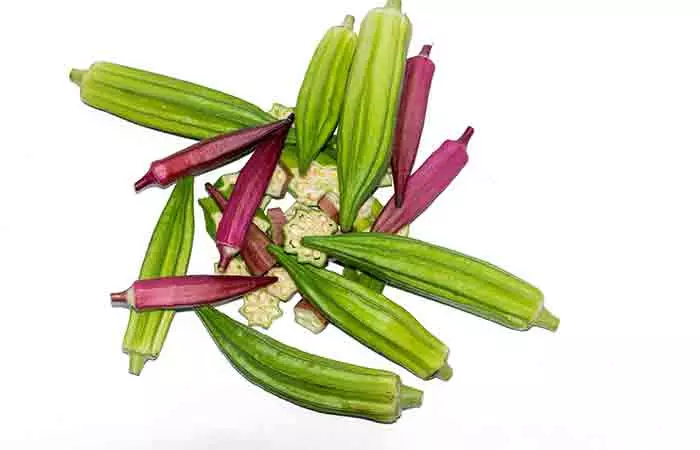
Did you know that there are different varieties of okra? Some of these varieties can grow up to 14 inches long. For instance, the cow horn variant of okra has a pod that is 14 inches long. Another variety of okra called the emerald was developed by the famous Campbell’s Soup Company as they tasted brilliant when added to soups. Some okra varieties produce red and burgundy color pods that are great for making pickles. The burgundy okra adds a nice touch of color to your dishes and is excellent for use in soups and making gumbo. Similarly, the hill country red okra is ideal for making pickles.
Kayla Stewart, a blogger, explains how okras make an important part of her African heritage, and she calls it the vegetable of survival. Reminiscing some deep-rooted memories, she says, “Okra mix is especially versatile; it’s suitable as a Sunday dinner or a celebratory meal. It was often the meal of choice to welcome my older siblings home from college and to signify love and comfort to a family member in town. It was also there for the hard times: I’d often find my mom in the kitchen cutting tops off of okra with the news playing on the TV in the living room. A national tragedy, racial turmoil, or a personal family event could propel okra mixes like no other, seemingly prepared with additional love, care, and need (i).”
 Trivia
TriviaThere are so many varieties of okra that come in different colors, and sizes, each one more amazing than the other. Now let us look at some of the health benefits of okra.
Top 5 Potential Health Benefits Of Okra
Okra is an extremely healthy vegetable that can be eaten raw, fried, baked, or dried.
The okra seed oil is a rich source of linoleic acid that is essential for your nutrition. It is a powerhouse of nutrients like pectin and insoluble fiber and is also abundant in antioxidants that are good for your health (1). Let us look at the top 5 potential health benefits of okra.
1. May Help In Lowering Risk Of Heart Diseases

Okra secretes a substance called mucilage. During digestion, it binds itself to cholesterol and prevents it from being absorbed into the bloodstream and, and flushes it out as excrement. This helps in reducing cholesterol levels and the risk of cardiovascular issues (1). Okra in powdered form also helps in reducing cardiovascular risks and improving heart health. A study divided mice into three groups, and they were fed a high-fat diet containing 1% or 2% okra powder and one group did not have okra powder in their diet. It revealed that the mice who had okra powder in their diet, had lesser amounts of cholesterol in their blood when compared to the other group. Okra also contains polyphenols that are anti-inflammatory and known to reduce inflammatory markers that are linked to cardiovascular issues (3), (4).
2. May Help In Lowering Blood Sugar Levels
People with high blood sugar levels may often have diabetes. Okra helps in reducing blood sugar levels as studies on mice reveal that okra seed and okra peel has a hypoglycemici A condition that causes low blood sugar (glucose) levels in the body, leading to symptoms like heart palpitations and dizziness. effect (5). However, a study on rats revealed some of the compounds present in okra may interfere in the absorption of metformin, a common medication given to diabetes patients (6). If you are diabetic you should consult with your doctor with regards to eating okra.
3. May Contain Anti-Cancer Properties

Okra contains a protein called lectin that may prevent the growth of cancer cells. A test-tube study conducted on rats to ascertain lectin’s cancer inhibitory properties revealed 63% less growth in the cancer cells(7). Another test-tube study on rats revealed that okra extract killed cancer cells (8). However, all of these tests were conducted on rats and used concentrated okra extracts. Further research on humans is required to substantiate the effectiveness of okra in cancer prevention.
4. May Help Reduce Stress And Its Side Effects
Okra seeds contain an anti-stress agent called adaptogen that helps relieve stress.
A study conducted on rats revealed that blood glucose, cholesterol, and triglyceride levels lowered when they were fed okra extracts. These levels generally rise when you are in a stressful situation (9).
5. May Help During Pregnancy

Okra is rich in vitamin B9, otherwise known as folate, which is essential for pregnant women. According to the CDC, it is recommended that pregnant women get 400mg of folic acid every day. The folate in okra helps in preventing miscarriages and supports the formation of neural tubes of the fetus. It also helps in preventing birth defects like spina bifidai A common birth defect in a developing baby that hinders proper development of the spine and spinal cord. and can help prevent constipation during pregnancy (10), (11). The okra is indeed a power-packed vegetable with numerous potential health benefits. Additionally, it contains vitamin A that may improve vision health. Now let us look at some of the possible side effects of okra.
6. May Improve Your Gut Health
Okra is one of the most commonly used veggies in traditional remedies for gut-related issues. It has several health benefits, especially for people with gastritis. Its mucus may neutralize stomach acids and prevent harmful bacteria from sticking to the stomach lining, thus reducing infection rates and gastritis. Its bioactive components are also similar to the drug omeprazole, which is used for treating gastritis and ulcers. Lastly, due to its high fiber content, it may help prevent constipation by promoting digestive movement (12).
Side Effects And Risks Of Okra

Okra is a safe and healthy vegetable that can be consumed without risks. However, there are a few side effects of okra. In some cases, eating too much okra can result in diarrhea, gas, and cramps due to the presence of fructans (a polymer of fructose molecules) (13). Another side effect of okra is that it may interfere with diabetes medication and blood thinners (6). In the next section, you’ll find out how to add okra to your diet.
How To Add Okra To Your Diet
Adding okra to your diet is easy; you can add it to your favorite stew, eat it as a pickle, or can deep fry it, seasoned with salt and pepper, or any other seasoning of your choice, and eat it like chips. Exploring okra water benefits can further enhance your experience with this vegetable. The possibilities are endless and are left to your creativity and imagination. Feel free to cook and experiment with okra in your kitchen.
 Trivia
TriviaPopular Recipes Using Okra
Here is a quick and easy recipe for okra roast. Ingredients Required
- 450g fresh whole okra pods chopped
- 1 medium-sized onion finely chopped
- 1 cup tomato puree
- 2 tablespoons of olive oil
- 1 teaspoon mustard seeds
- 1 tablespoon coriander powder
- 1 teaspoon chili powder
- 1 teaspoon white wine vinegar
- ¼ cup of water
- salt and pepper according to taste
Preparation
- Start by washing the okra and pat drying it with a towel. Once dry, chop the stem end of the okra and set it aside.
- In a pan, heat up olive oil, add chopped onion, mustard seeds, coriander powder, chili powder, and cook till onions are translucent.
- Add 1 cup of tomato puree and salt as per your taste and stir fry for 2 minutes.
- Now add the chopped okra pods, vinegar, and water.
- Cover the lid and cook for 5-8 minutes on simmer.
- Add pepper powder if you want to give it some spice and heat.
- Garnish with some coriander leaves and enjoy it hot and fresh.
Pro-Tips
- It is better that you use fresh okra rather than the frozen version.
- You can chop up 2 tomatoes and use them instead if you don’t have tomato puree.
- If you do not want your roast to be slimy, avoid chopping or slicing the okra pod.
Another easy okra recipe that you can try is fat-free okra chips. Ingredients Required
- 250g okra slit lengthwise and cut into 1-inch pieces (wash before cutting)
- ¼ teaspoon turmeric powder
- 1 teaspoon paprika powder
- salt as per taste
- ½ tablespoon chickpea flour
- ½ tablespoon all-purpose flour
- 1-2 tablespoons of olive oil
Preparation
- In a bowl add okra and sprinkle it with some oil so that the seasoning sticks to it.
- Add all the ingredients and mix well. Ensure all pieces are coated with the seasoning.
- Preheat the oven to 450℉. Once it is heated, in a baking tray sprinkle some oil and spread the seasoned okra.
- Place the tray in the oven and bake for 5 minutes. Check if it is cooked. The okra must feel dry to touch.
- Repeat this process till the okra is cooked. Keep checking frequently to ensure it doesn’t burn.
- Serve with a dip of your choice or eat as is.
 Trivia
TriviaInfographic: How Okra Can Help Improve Your Health
Okra is a popular vegetable used in many cuisines and has a rich nutritional profile. It is replete with many vitamins and minerals that help treat several ailments. From lowering the risk of heart disease to preventing miscarriages, this veggie offers various advantages. In the infographic below, we have listed the important benefits of including okra in your diet. Check it out for more information. Some thing wrong with infographic shortcode. please verify shortcode syntax
Frequently Asked Questions
Is okra a superfood?
Yes, okra is considered a superfood in many parts of the world, given its rich nutrient content and significant health benefits.
Does okra detox your body?
As per studies, the phytochemicals in okra may help in cholesterol breakdown and liver detoxification (11).
Is okra good for weight loss?
Okra polysaccharides have been shown to aid weight reduction. In addition, other formulations containing okra powder have also been shown to benefit weight management (11).
Is okra good for skin?
The polyphenols and carotene in okra are responsible for their beneficial effects on skin health (11).
Can okra remove wrinkles?
Okra is rich in antioxidants and vitamins A and C, which can be beneficial in reducing the appearance of fine lines and wrinkles.
Is okra good for menstruation?
Yes, okra is a rich source of vitamin K, which can help control heavy menstrual bleeding (14).
Can okra help to conceive?
The vitamin C and folate content in okra can promote healthy pregnancy and fetal development (14).
Illustration: Okra: Health Benefits, Nutrition, Recipes, And Side Effects

Image: Stable Diffusion/StyleCraze Design Team
Explore the nutritious benefits of okra. Click on this video to learn the various ways in which this vegetable contributes to your overall health.
Personal Experience: Source
StyleCraze's articles are interwoven with authentic personal narratives that provide depth and resonance to our content. Below are the sources of the personal accounts referenced in this article.
i. Okra, the Vegetable of Survivalhttps://heated.medium.com/okra-the-vegetable-of-survival-45caaf2ff9a3
References
Articles on StyleCraze are backed by verified information from peer-reviewed and academic research papers, reputed organizations, research institutions, and medical associations to ensure accuracy and relevance. Read our editorial policy to learn more.
- Nutritional Quality and Health Benefits of “Okra” (Abelmoschus esculentus): A Review https://www.researchgate.net/publication/277813487_Nutritional_Quality_and_Health_Benefits_of_Okra_Abelmoschus_esculentus_A_Review
- OkraRaw https://fdc.nal.usda.gov/fdc-app.html#/food-details/169260/nutrients
- Hypolipidemic Activity of Okra Is Mediated Through Inhibition of Lipogenesis and Upregulation of Cholesterol Degradation https://pubmed.ncbi.nlm.nih.gov/23606408/
- Antioxidative Activities and Phenolic Content of Extracts from Okra (Abelmoschus esculentus L.) https://medwelljournals.com/cgi-sys/suspendedpage.cgi?doi=rjbsci.2010.310.313
- A review on Diabetes and Okra (Abelmoschus esculentus) https://www.researchgate.net/publication/322571262_A_review_on_Diabetes_and_okra_Abelmoschus_esculentus
- Water-soluble Fraction of Abelmoschus esculentus L Interacts with Glucose and Metformin Hydrochloride and Alters Their Absorption Kinetics after Coadministration in Rats https://www.ncbi.nlm.nih.gov/labs/pmc/articles/PMC3263724/
- Lectin of Abelmoschus Esculentus (okra) Promotes Selective Antitumor Effects in Human Breast Cancer Cells https://pubmed.ncbi.nlm.nih.gov/24129958/
- Antiproliferative and Proapoptotic Actions of Okra Pectin on B16F10 Melanoma Cells https://pubmed.ncbi.nlm.nih.gov/20013817/
- Phytochemical Analysis Antioxidant Antistress and Nootropic Activities of Aqueous and Methanolic Seed Extracts of Ladies Finger (Abelmoschus esculentus L.) in Mice https://www.ncbi.nlm.nih.gov/labs/pmc/articles/PMC4221879/
- Okra (Abelmoschus Esculentus) as a Potential Dietary Medicine with Nutraceutical Importance for Sustainable Health Applications https://pmc.ncbi.nlm.nih.gov/articles/PMC7865958/
- Okra (Abelmoschus Esculentus) as a Potential Dietary Medicine with Nutraceutical Importance for Sustainable Health Applications https://www.proquest.com/openview/0930d438ee43e71c584fc715987fd799/1?pq-origsite=gscholar&cbl=2032355
- Understanding the traditional values and use of okra among pregnant women in western Ethiopia: a qualitative study
https://www.ncbi.nlm.nih.gov/pmc/articles/PMC10106077/ - Dietary Fructose Intolerance Fructan Intolerance and FODMAPs
https://www.ncbi.nlm.nih.gov/labs/pmc/articles/PMC3934501/ - Nutritional Quality and Health Benefits of Okra (Abelmoschus Esculentus): A Review
https://www.researchgate.net/profile/Habtamu-Fekadu-Gemede/publication/310503444_Nutritional_Quality_and_Health_Benefits_of_Okra_Abelmoschus_Esculentus_A_Review/links/5830708308ae102f0731c836/Nutritional-Quality-and-Health-Benefits-of-Okra-Abelmoschus-Esculentus-A-Review.pdf
Read full bio of Gabrielle Kane
Read full bio of Varsha Patnaik
Read full bio of Ravi Teja Tadimalla
Read full bio of Payal Karnik








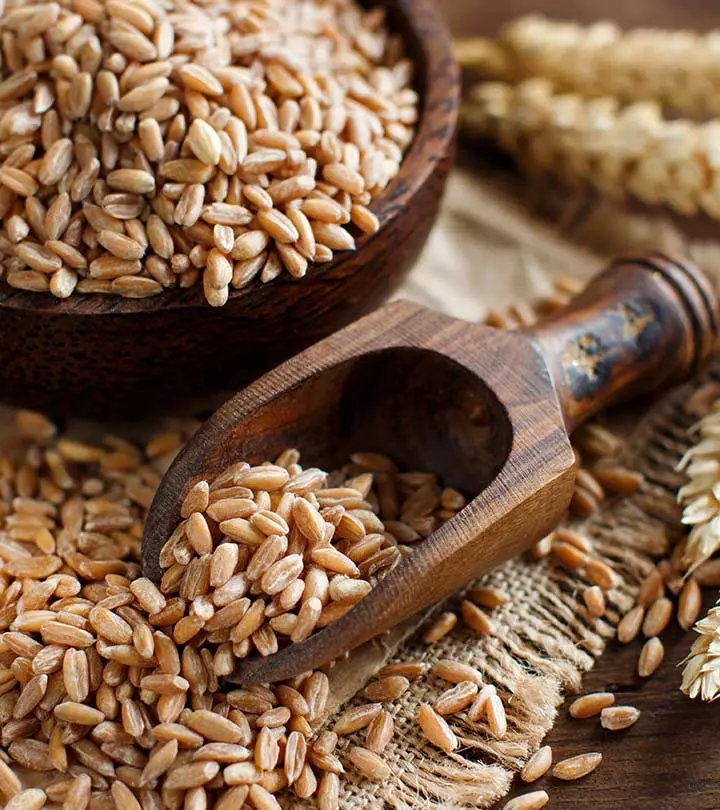
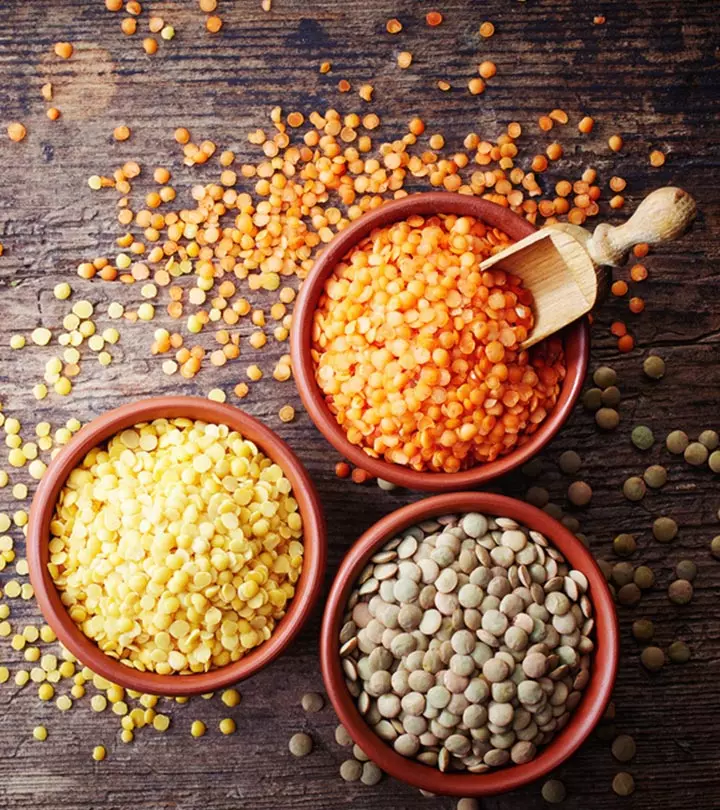
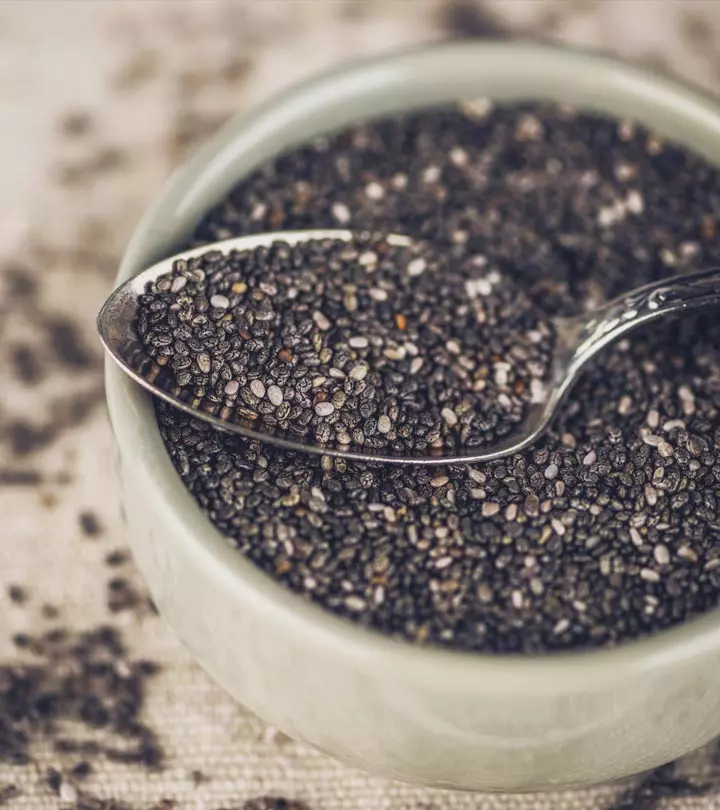

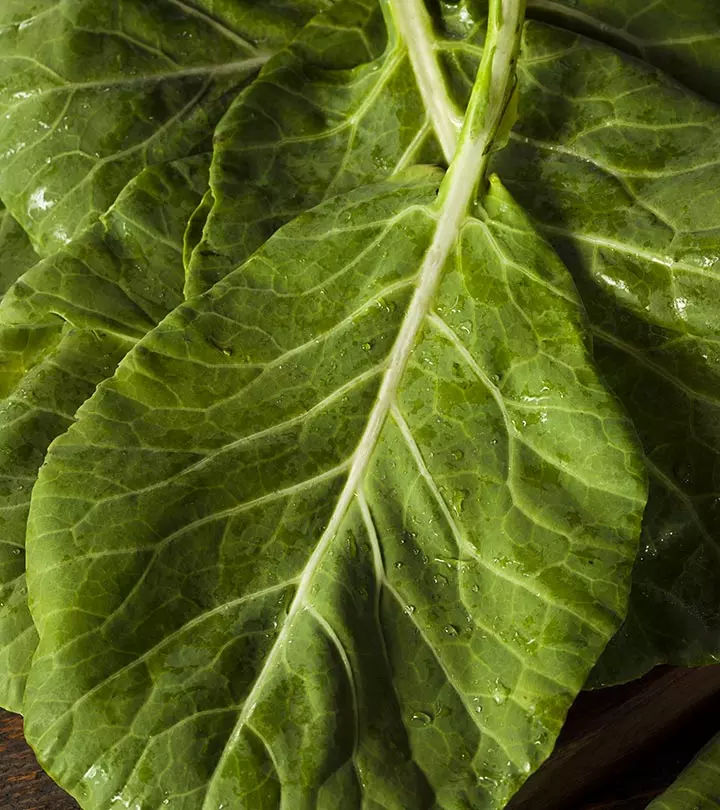

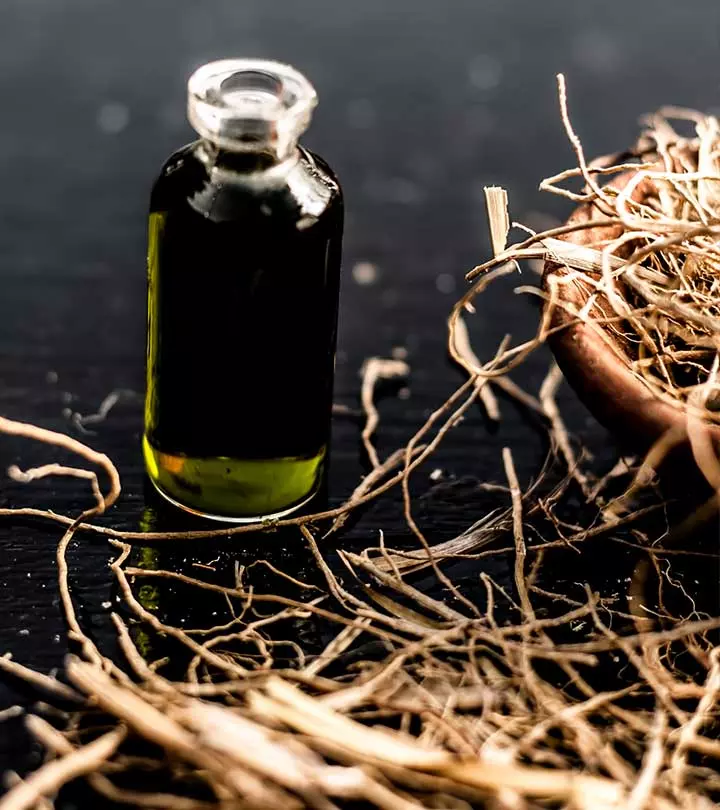
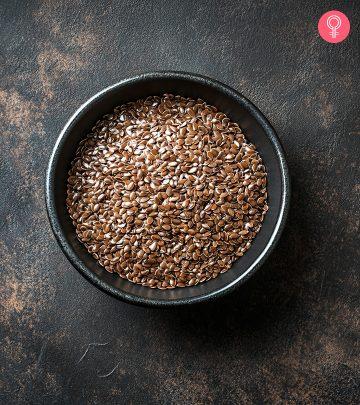

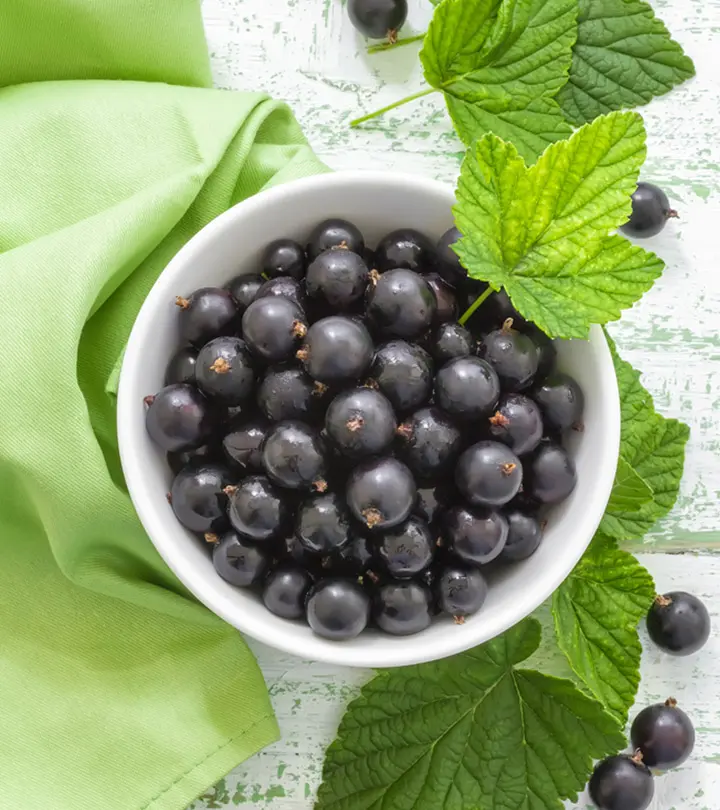
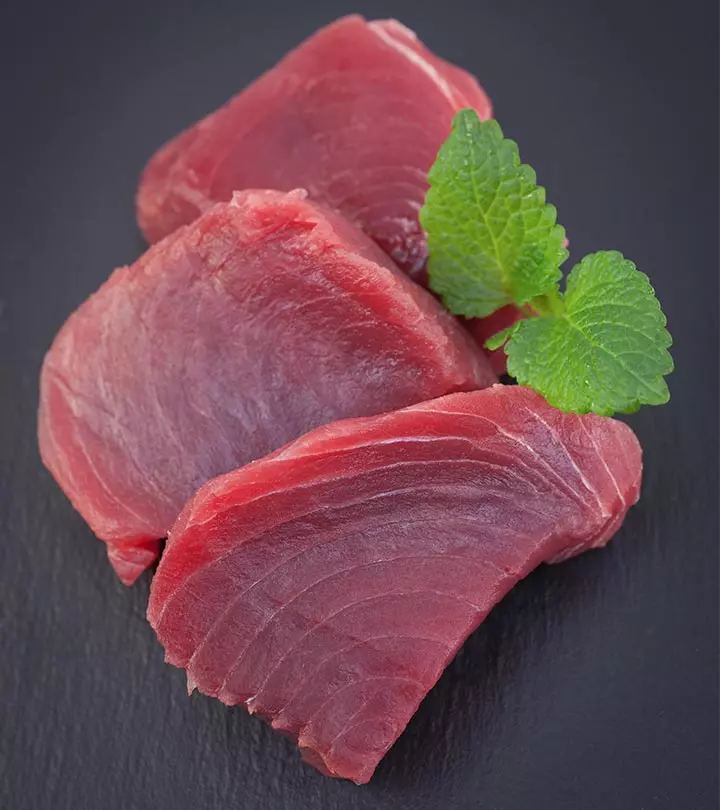
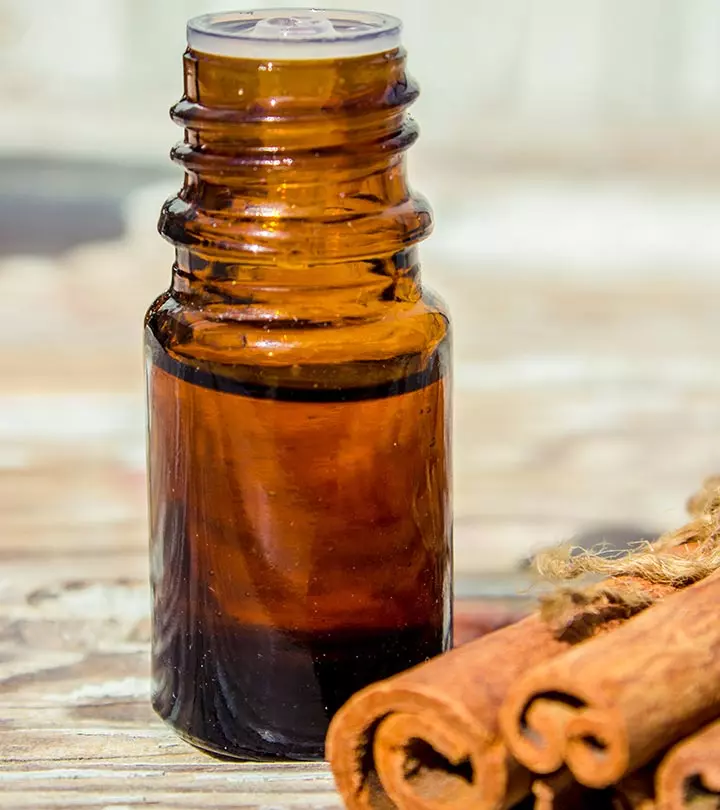

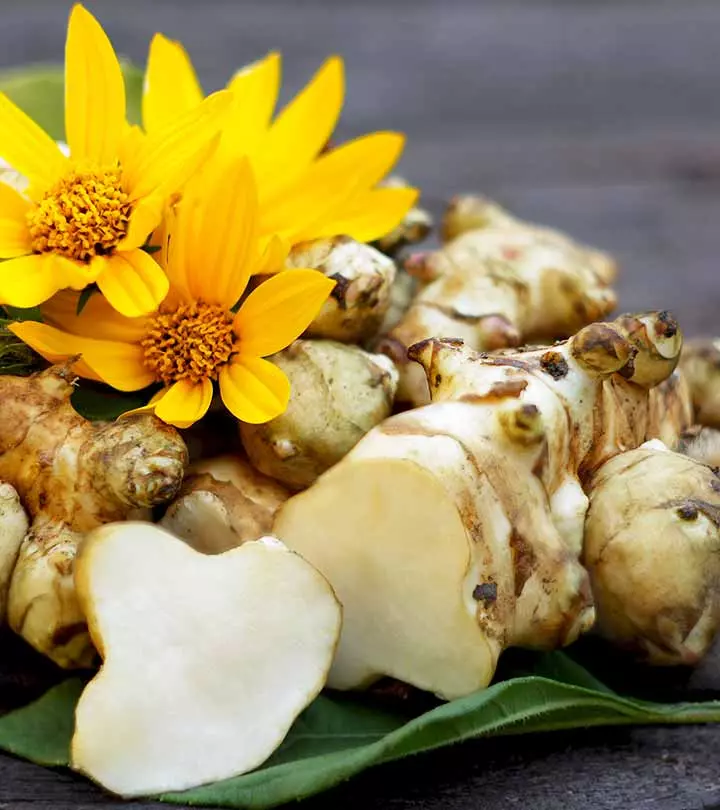
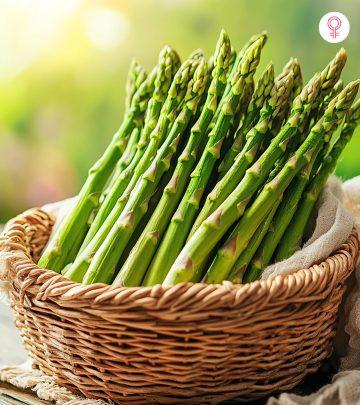



Community Experiences
Join the conversation and become a part of our empowering community! Share your stories, experiences, and insights to connect with other beauty, lifestyle, and health enthusiasts.